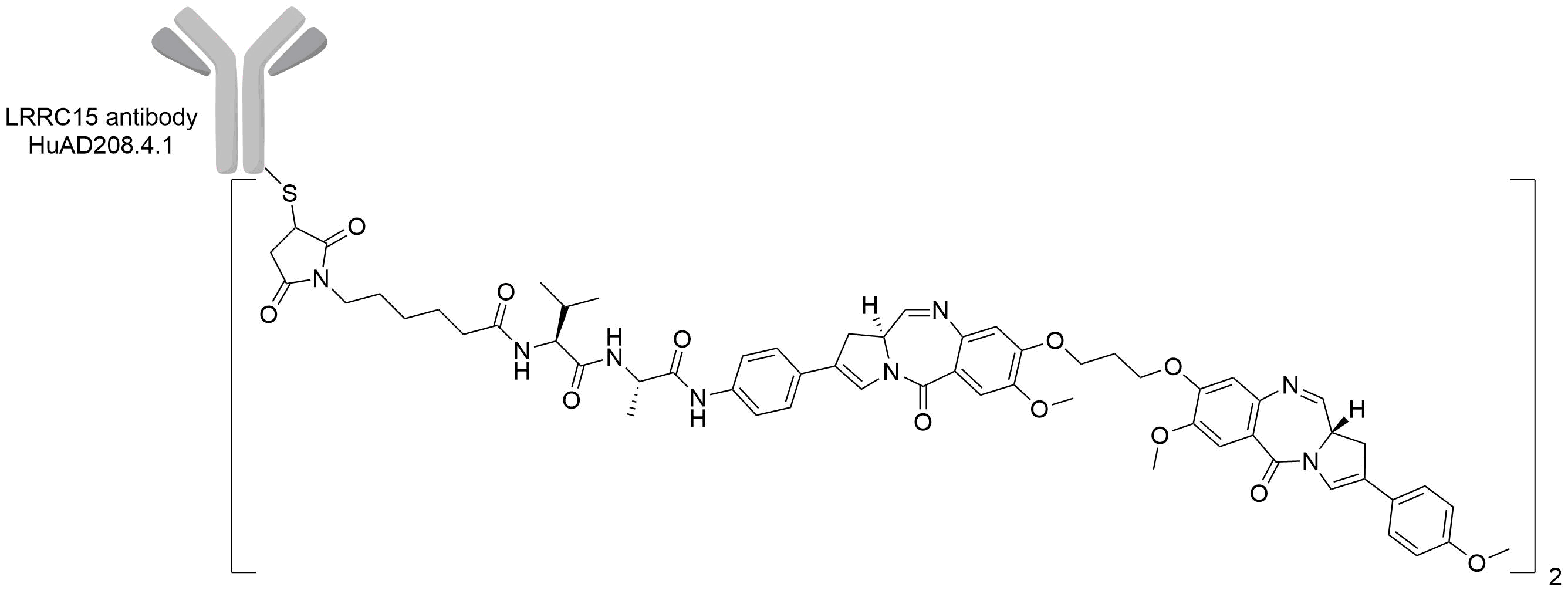Antibody-drug Conjugate Information
General Information of This Antibody-drug Conjugate (ADC)
| ADC ID |
DRG0QBADZ
|
|||||
|---|---|---|---|---|---|---|
| ADC Name |
HuAD208.4.1-PBD-DAR2
|
|||||
| Synonyms |
HuAD208.4.1 PBD-DAR2; huAD208.4.1 PBD-DAR2
Click to Show/Hide
|
|||||
| Organization |
AbbVie, Inc.
|
|||||
| Drug Status |
Investigative
|
|||||
| Indication |
In total 1 Indication(s)
|
|||||
| Drug-to-Antibody Ratio |
2
|
|||||
| Structure |

|
|||||
| Antibody Name |
huAD208.4.1
|
Antibody Info | ||||
| Antigen Name |
Leucine-rich repeat-containing protein 15 (LRRC15)
|
Antigen Info | ||||
| Payload Name |
PBD dimer
|
Payload Info | ||||
| Therapeutic Target |
Human Deoxyribonucleic acid (hDNA)
|
Target Info | ||||
| Linker Name |
Mc-Val-Ala
|
Linker Info | ||||
| Conjugate Type |
Random conjugation through reduced inter-chain cysteines.
|
|||||
| Combination Type |
VaPBD
|
|||||
General Information of The Activity Data Related to This ADC
Discovered Using Cell Line-derived Xenograft Model
Revealed Based on the Cell Line Data
Full List of Activity Data of This Antibody-drug Conjugate
Discovered Using Cell Line-derived Xenograft Model
| Experiment 1 Reporting the Activity Date of This ADC | [1] | ||||
| Efficacy Data | Tumor Growth Inhibition value (TGI) | 91.00% (Day 18) | High LRRC15 expression (LRRC15+++; IHC 3+) | ||
| Method Description |
EBC-1 squamous NSCLC cells (5 million) were implanted subcutaneously into SCID mice, and mice were randomized when the tumors reached 225 mm and dosed with ADC at 0.6 mg/kg Q7Dx2 (one dose given every 7 days for a total of 2 doses) or isotype antibody at 6 mg/kg intraperitoneally starting on day 0.
|
||||
| In Vivo Model | EBC-1 CDX model | ||||
| In Vitro Model | Lung squamous cell carcinoma | EBC-1 cells | CVCL_2891 | ||
| Experiment 2 Reporting the Activity Date of This ADC | [1] | ||||
| Efficacy Data | Tumor Growth Inhibition value (TGI) | 95.80% (Day 26) | High LRRC15 expression (LRRC15+++; IHC 3+) | ||
| Method Description |
NCI-H1650 adeno NSCLCcells (5 million) were implanted subcutaneously into SCID/Beige mice, and mice were randomized whenthe tumors reached 225 mm and dosed with ADC at 0.6 mg/kg or isotype antibody at 12 mg/kg intraperitoneally once on day 0.
|
||||
| In Vivo Model | NCI-H1650 CDX model | ||||
| In Vitro Model | Lung adenocarcinoma | NCI-H1650 cells | CVCL_1483 | ||
Revealed Based on the Cell Line Data
| Experiment 1 Reporting the Activity Date of This ADC | [1] | ||||
| Efficacy Data | Half Maximal Inhibitory Concentration (IC50) | 10.00 nM | Positive LRRC15 expression (LRRC15 +++/++) | ||
| Method Description |
In vitro cell killing in murine Balb/c BM-MSC (Cyagen) mesenchymal stem cells in thepresence of 10 ng/mL TGF by isotype-PBD-DAR2 or huAD208.4.1-PBD-DAR2. IC50 values were determined by quantitating viable cells using a CellTiter-Glo luminescent assay.
|
||||
| In Vitro Model | Normal | Mouse bone marrow-derived mesenchymal stem (BM-MSC) cells | Mus musculus | ||
| Experiment 2 Reporting the Activity Date of This ADC | [1] | ||||
| Efficacy Data | Half Maximal Inhibitory Concentration (IC50) | 10.00 nM-100.00 Nm | Positive LRRC15 expression (LRRC15 +++/++) | ||
| Method Description |
In vitro cell killing in human BM-MSC (Lonza) mesenchymalstem cells in the presence of 10 ng/mL TGFB by isotype-PBD-DAR2 or huAD208.4.1-PBD-DAR2. IC50 values were determined by quantitating viable cells using a CellTiter-Glo luminescent assay.
|
||||
| In Vitro Model | Normal | Human bone marrow-derived mesenchymal stem (BM-MSC) cells | Homo sapiens | ||
